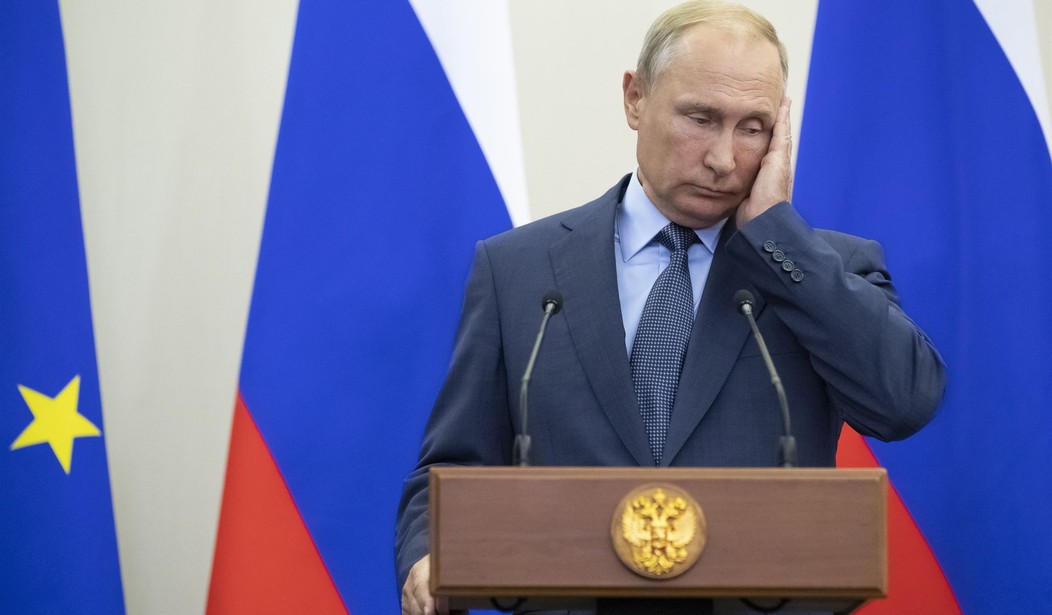Vladimir Putin waxed nostalgic for the days of the Soviet Union, and appears poised to deliver Russia back to the heady days of bread lines and forced service. Russians have responded by taking a page out of the old Soviet playbook, too — fleeing across the border. The New York Times reports that the war in Ukraine and the economic sanctions imposed as a result has created a large and growing exodus:
They lined up at ATM’s, desperate for cash after Visa and Mastercard suspended operations in Russia, swapping intelligence on where they could still get dollars. At Istanbul cafes, they sat quietly studying Telegram chats or Google Maps on their phones. They organized support groups to help other Russian exiles find housing.
Tens of thousands of Russians have fled to Istanbul since Russia invaded Ukraine last month, outraged about what they see as a criminal war, worried about conscription or the possibility of a closed Russian border, or concerned that their livelihoods are no longer viable back home.
And they are just the tip of the iceberg. Tens of thousands more traveled to countries like Armenia, Georgia, Uzbekistan, Kyrgyzstan and Kazakhstan which are better known as sources of migration to Russia. At the land border with Latvia — open only to those with European visas — travelers reported waits lasting hours.
No one has seen anything like it in a century, one Russian expert tells the NYT:
That has created a flight — though much smaller than in Ukraine — that some are comparing to 1920, when more than 100,000 opponents of the Communist Bolsheviks during the Russian Civil War left to seek refuge in what was then Constantinople.
“There has never been anything like this before in peacetime,” said Konstantin Sonin, a Russian economist at the University of Chicago. “There is no war on Russian territory. As a single event, it is pretty huge.”
Pedantic note: It was Istanbul then, too. It had been Istanbul for centuries among the Turks; Western countries didn’t adopt it until the 1930s, when Mustafa Kemal insisted on it.
At any rate, 1920 is hardly the only antecedent. Iron Curtain refugees poured into the West through East Berlin too, so much so that Nikita Khrushchev built the Berlin Wall to stop it. When the wall finally fell in 1989, refugees poured into the West again, at least briefly until it became obvious that the entire Soviet system in eastern Europe had collapsed. The overwhelming desire to flee Russia in the Soviet period between 1920 and 1989 got answered by the Communists in policies that made the Russian empire into a prison state, where only the most loyal and connected could easily travel abroad — and even then, defections became common. Flight from Communism became one of the most significant cultural hallmarks of the 20th century, even if Western media downplayed it in the latter half of that period.
That’s what makes this flight ironic, as it is not just ordinary Russians who have fled into exile. Their news media has largely fled Putin’s tyrannical edicts and are now reconstituting their organizations outside his reach, the Washington Post reported yesterday:
The media clampdown in Russia that followed the invasion of Ukraine has decimated a journalism community already ground to near extinction by years of oppression. The New York-based Committee to Protect Journalists said at least 150 of Russia’s few remaining independent reporters and editors have left since tanks rolled into Ukraine, plunging Russia into what the group called an “information dark age.”
Now — in Lithuania, Latvia, Georgia and other former Soviet states where Russian remains a common language — they are scrambling to set up newsrooms in exile, determined to continue the hazardous mission of speaking truth to authoritarianism.
“They are going to need to rebuild the infrastructure outside of Russia, and that won’t be easy,” said Vytis Jurkonis, Lithuania director at Freedom House, the pro-democracy watchdog based in Washington.
The immediate need, before any newsrooms or studios are built, is to get journalists and their families residency permits, housing, schools and ways to keep reporting.
“The logistics are hard,” Jurkonis said. “But they need to go do their work and not lose their audience. That’s what the Kremlin wants, to separate these critical journalists from their audience.”
To some extent, the exodus is the message. At least in the short term, Russians that relied on these independent outlets for some balanced reporting will feel their absence keenly and will likely draw the correct conclusions from it. The more of their countrymen who flee, too, the stronger those conclusions will be. That won’t last forever or even for very long, so it’s critical that these journalists succeed in finding ways to reconnect to their old audiences. The West could help with that project by dusting off the Cold War information apparatus and retooling it for Cold War II. Some of the more well-known Russian journalists could provide a big dose of credibility for Voice of America and Radio Free Europe broadcasts and reporting.
That, along with Putin’s increasingly draconian domestic measures, will likely amplify the exodus out of Russia. Putin’s tyranny will eventually either defenestrate Russia of its resources for a prosperous future, or Putin will have to ring down Iron Curtain II to stanch the human-resources bleeding. Both of those will have dramatic and dire consequences for Russia, but almost certainly for Putin too.









Join the conversation as a VIP Member